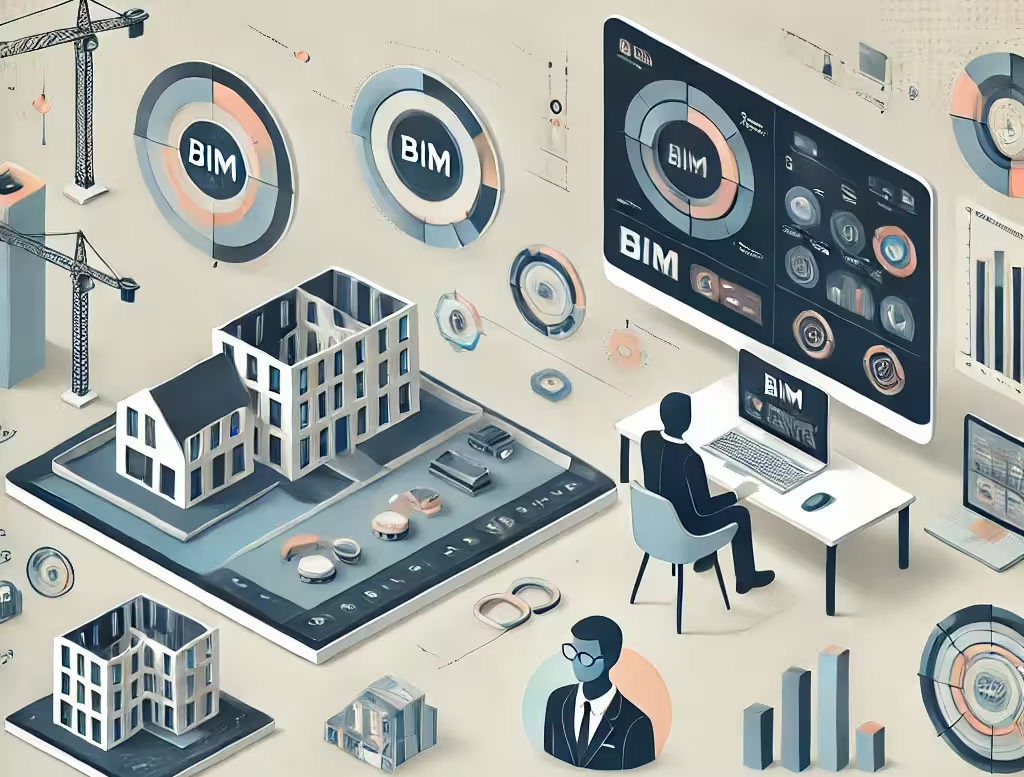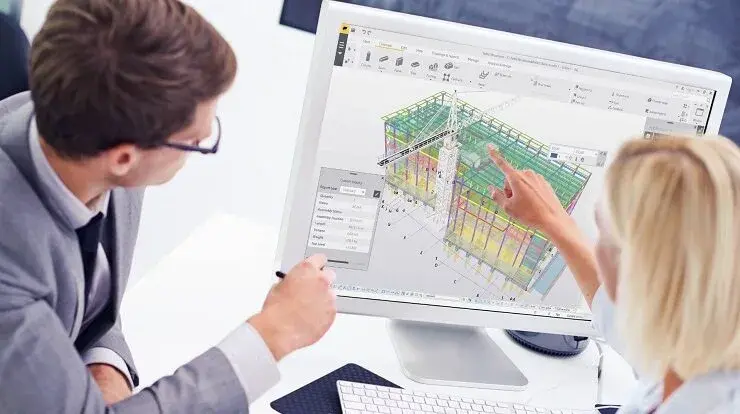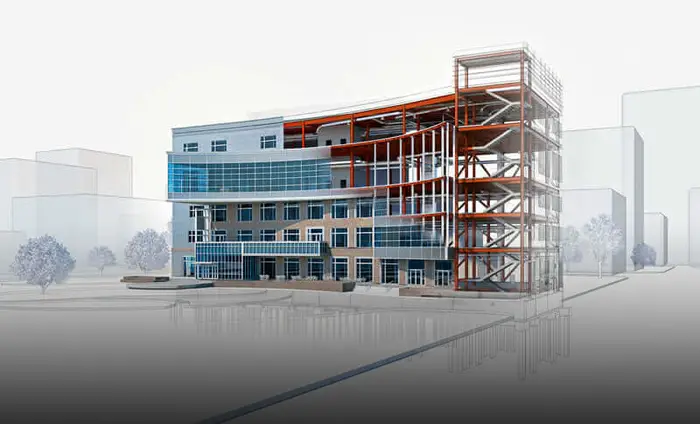The Ultimate Career Guide to BIM Consultant: Roles & Salaries

Table of Contents
In the architectural advancements world, the role of a BIM (Building Information Modelling) consultant has become more crucial than ever. If you are a professional who wants to transform your architectural dreams into reality with the help of cutting-edge technology, pursuing a career as a BIM consultant can be the right choice for you.
A BIM consultant specialises in using and implementing BIM processes and technologies in architectural and construction projects. His role is to ensure BIM technologies are successfully implemented in the project workflow, resulting in improved efficiency, accuracy, and collaboration among stakeholders. For this to happen, he uses powerful BIM tools like Navisworks and Revit software to create and manage digital models of a building structure.
Read the blog to explore the roles and responsibilities of a BIM consultant, along with their salaries.
Who is a BIM Consultant?
A BIM Consultant is a professional who specialises in BIM. His role is to create and manage digital models of the physical and functional characteristics of places. By using the best BIM tools like Revit and Navisworks software, they help plan, design, construct, and manage building projects. The key responsibilities of a BIM Consultant include developing and maintaining detailed building models, coordinating with architects, engineers, and construction teams, and ensuring that all project data is accurate and up-to-date. BIM consultants are crucial as they help enhance communication and coordination among project stakeholders, improve project accuracy, and reduce errors and rework.
Key Job Roles & Responsibilities under BIM Consultancy
A career as a BIM Consultant offers diverse opportunities and can be very rewarding as BIM consultant job salaries are quite competitive. However, understanding the key job roles and responsibilities is crucial to excel in this career. Explore the roles and responsibilities of BIM consultants along with their average salary range below:
1. BIM Manager
- Salary Range: 6.6 Lakhs to 30.0 Lakhs
A BIM Manager oversees the successful implementation and management of BIM technology within an organisation or a construction project. They manage parametric design and parametric components to optimise project workflows. Some vital skills are proficiency in project management, BIM software proficiency, and strong communication skills. Familiarity with collaboration tools and design collaboration is also essential for BIM Managers. Some of their responsibilities include:
- Create BIM Protocols and Establish Standards: A BIM Manager is responsible for developing and implementing BIM strategies and protocols that are aligned with the project’s objectives. It involves creating procedures on how BIM should be used and maintaining its standards to ensure the project quality.
- Coordinate BIM Activities: They look after the coordination, creation, and maintenance of the BIM models. The BIM Manager is responsible for ensuring accuracy and update of the latest design changes.
- Tool Selection and Updates: A BIM Manager is responsible for selecting and managing the appropriate BIM software tools and technologies that best fit the project's needs. This involves staying updated on the latest BIM tools and advancements to ensure the team is using the most effective technology.
- Issue Resolution and Assistance: The BIM Manager also addresses and resolves issues related to BIM implementation and usage. It involves troubleshooting technical problems, finding solutions to workflow challenges, and ensuring the smooth operation of BIM processes. They provide ongoing technical assistance to project teams, offering support and guidance to ensure that all team members can use BIM tools effectively and efficiently.
2. BIM Coordinator
- Salary Range: 3.5 Lakhs to 24.0 Lakhs
A BIM Coordinator facilitates the coordination between different teams. They ensure seamless collaboration among architects, engineers, contractors, and other stakeholders, and maintain the accuracy of BIM data. Besides, they also implement collaboration tools for different staff, ensuring BIM data accuracy, and providing technical support for project management. Here are some of their essential responsibilities:
- Clash Detection: A BIM Coordinator works collaboratively with design and engineering teams to resolve identified clashes, developing solutions that address conflicts and ensuring that the revised models are clash-free. Maintaining detailed records of clash detection activities and resolutions is also essential to ensure that all changes and updates are documented for future reference.
- Model Coordination and Integration: A key responsibility of a BIM Coordinator is to manage the integration of BIM models from various disciplines such as architecture, structural engineering, and MEP (Mechanical, Electrical, and Plumbing). They ensure that all models are accurately aligned and integrated into a unified project model, maintaining consistency by applying standard naming conventions, file structures, and collaboration protocols.
- Quality Assurance: Ensuring quality assurance in BIM models is a vital role of the BIM Coordinator. They conduct regular quality checks and audits on BIM models to ensure they meet project standards and requirements. This includes verifying that the models are up-to-date, accurate, and reflect the design intent.
- Documentation and Reporting: The BIM Coordinator also generates reports on BIM progress and issues for project stakeholders, ensuring transparency and accountability. They document changes, decisions, and actions taken during the BIM process, providing a comprehensive record that can be referenced throughout the project lifecycle.
3. BIM Engineer
- Salary Range: 2.0 Lakhs to 8.8 Lakhs
A BIM Engineer integrates BIM consulting services into engineering processes, leveraging the best BIM tools to optimise workflows. They focus on streamlining project execution and their core responsibilities include creating detailed BIM models, ensuring interdisciplinary coordination, implementing collaboration tools, supporting team communication, and troubleshooting technical issues. Below are the responsibilities of a BIM Engineer:
- Technical Analysis and Simulations: The BIM Engineer performs technical analysis and simulations using BIM models to identify potential issues and optimise designs. They use various tools for finite element analysis to validate the engineering aspects of the models.
- Model Development and Management: The BIM Engineer is responsible for developing and managing detailed BIM models that accurately represent engineering designs and specifications. They use advanced BIM software tools to create precise models for structural and MEP systems.
- Quality Control: BIM Engineers also conduct quality control checks on BIM models to ensure project reliability and accuracy. They regularly review the models to identify and solve the errors. They implement quality assurance procedures to maintain the integrity and reliability of the BIM models throughout the project lifecycle.
- Communication and Coordination: A BIM Engineer coordinates with other engineering disciplines to ensure that all models are integrated and consistent. They facilitate communication and collaboration between different engineering teams to resolve any design conflicts. This interdisciplinary coordination helps maintain the integrity and accuracy of the BIM models.

4. BIM Technician
- Salary Range: 3.5 Lakhs to 18.0 Lakhs
A BIM Technician assists in creating and developing detailed BIM models based on design specifications using software tools like Revit and AutoCAD. They handle parametric components to assist in project planning. Their key responsibilities include updating BIM models, aiding in design modifications, maintaining data integrity, and working with project teams for effective design collaboration. Here are some of the crucial responsibilities of a BIM Technician:
- Clash Detection and Reporting: One of the essential roles is to perform clash detection to identify conflicts within BIM models using specialised software. They report detected clashes to BIM Coordinators or Specialists for resolution to ensure smooth project execution.
- Support and Training: BIM Technicians provide support to team members in using BIM tools and following established protocols. They also assist in training new team members on BIM processes and software usage to ensure consistency and efficiency.
- Model Updates and Maintenance: Another responsibility is to update and maintain BIM models throughout the project lifecycle, reflecting the latest design modifications and revisions. They also ensure models remain current and accurate by coordinating with design teams.
- Documentation and Production: BIM Technicians also generate and maintain comprehensive documentation and drawings related to BIM models. They also go through the documentation process to ensure that it is accurate, up-to-date, and readily available for project stakeholders.
5. BIM Data Analyst
- Salary Range: 4.5 Lakhs to 8.0 Lakhs
A BIM Data Analyst analyses data from models created with BIM tools like Revit, AutoCAD, and more. They interpret parametric design and parametric components data to provide insights for project optimisation. They play a crucial role in interpreting the data within BIM models to provide insights that support decision-making and optimise project outcomes. Their expertise helps ensure that the vast amounts of data produced in BIM are used effectively to improve efficiency, reduce costs, and enhance the overall quality of construction projects. Some of BIM Data Analyst’s responsibilities include:
- Data Security and Compliance: Ensuring the security and compliance of BIM data is also an important aspect of a BIM Data Analyst’s role. They implement data security measures to protect sensitive information and ensure that data handling practices comply with industry standards and regulations.
- Data Extraction and Management: A BIM Data Analyst extracts data from BIM models and organises it for analysis. They use various BIM tools to gather relevant information, ensuring that data is accurately captured and stored. Effective data management involves maintaining data integrity and ensuring that all data is up-to-date, consistent, and readily accessible for analysis.
- Data Analysis and Reporting: A BIM Data Analyst analyses BIM data to identify trends, patterns, and potential issues. They use their analytical skills to interpret complex data sets and provide valuable insights that can influence project decisions.
- Collaboration and Communication: Effective communication and collaboration with other project team members are essential for a BIM Data Analyst. They work closely with architects, engineers, project managers, and other stakeholders to understand their data needs and provide the necessary insights.
Essential Skills for a BIM Consultant

When applying for a BIM consultant job, it is essential to ensure you match up with the required skills. To excel in this role, one must possess a diverse skill set of skills that ensures effective project execution and client satisfaction. Here are some prominent skills for a BIM consultant:
1. Effective Communication Skills
Strong communication skills are essential for design collaboration. BIM consultants must be able to articulate their ideas clearly and effectively to various stakeholders. This includes presenting complex technical information in a way that is understandable to non-technical clients. Good communication ensures that everyone involved in the project is on the same page, reducing the risk of errors and ensuring that the client’s vision is valued.
2. Problem-Solving Skills
Problem-solving skills are essential for overcoming the various challenges that arise during a project. A BIM consultant must be able to think critically and come up with innovative solutions to complex problems. This ability ensures that the project stays on track, even when unforeseen issues occur.
Also Check out: Everything You Need to Know About BIM and Architectural Visualisation
3. Project Management Abilities
A successful BIM consultant needs robust project management abilities. This involves planning, executing, and overseeing projects to ensure they are completed on time and within budget. Skills in scheduling, resource allocation, and risk management are crucial. Effective project management ensures that BIM consulting services deliver high-quality results and meet client expectations, ultimately leading to successful project outcomes and client satisfaction.
4. Knowledge of Parametric Components
Knowledge of parametric components is vital as these components are reusable elements within BIM models that can be adjusted based on specific parameters. Understanding how to create and manage parametric components allows consultants to streamline the design process, enhance efficiency, and maintain consistency across the project. This skill is crucial for producing high-quality models quickly and accurately.
Also Read: A Guide to Architectural Diagrams: Which Ones to Use and Why?
Conclusion
A career as a BIM consultant offers a range of diverse and rewarding job opportunities in the architectural and construction industries. From managing the design model to ensuring effective collaboration between the stakeholders, the role is crucial for modern project success.
If you are looking to advance your career in BIM, you can enrol yourself in the BIM Professional Course for Architects offered by Novatr. These courses are designed to help professionals excel in their BIM careers and will help you learn the necessary skills and knowledge to excel in BIM consultant jobs as well.
Visit our Resources Page to stay updated with the latest industry trends and BIM consultant salary range and transform your architectural dreams into reality!

 Thanks for connecting!
Thanks for connecting!

.png)
.jpg)



.jpg)


